
Mona Baker
Overview
* Professor of Translation Studies at the University of Manchester
* Holds extreme anti-Israel and anti-Semitic views
* Fired two Israeli scholars from her academic journals and banned articles by Israelis
* Supports the agendas of the Boycott, Divestment, & Sanctions Movement
* Believes that the act of translation is inherently political
The Egyptian-born Mona Baker, who has worked as a professional translator since the early 1990s, is the director of the Center for Translation and Intercultural Studies at the University of Manchester Institute of Science and Technology (UMIST). She began her tenure at UMIST in 1995. Prior to that, Baker lectured on linguistics at the University of Birmingham (United Kingdom). She also has served as a visiting or guest professor at such institutions as South China Agricultural University (2007-2010) and Shanghai Jiao Tong University (2008-2010).
Baker holds a bachelor’s degree in English and Comparative Literature from American University in Cairo; a master’s degree in Special Applications of Linguistics from the University of Birmingham; and a DSc (higher doctorate) from the University of Manchester Institute of Science and Technology. In 1992 she published In Other Words, a book designed to train aspiring translators. Three years later, she founded the St. Jerome Publishing Company and the international journal, The Translator. In 1998 Baker launched Translation Studies Abstracts, an online database of abstracts of monographs, edited volumes, reference works, bibliographies, academic dissertations, and individual articles in the field of translation. And in 2006 she authored the book Translation and Conflict.
In May 2002 Baker joined scores of European academics in signing an open letter, published in Britain’s Guardian newspaper, calling for a moratorium on all cultural and research interaction with Israeli institutions until such time as the government of Israel agreed to abide by various (unspecified) United Nations resolutions, and to resume peace negotiations with Yasser Arafat. The petition was organized and published during a time when Palestinian suicide bombings against Israel were occurring with great regularity. But Baker, for her part, characterized it as a period of “sharp rise in the level of atrocities committed against the Palestinian population in the West Bank and Gaza.”
Baker stirred controversy in June 2002 when she dismissed a pair of individuals from the boards of her two journals—The Translator and Translation Studies Abstracts—solely because both of those individuals were “affiliated to … Israeli institution[s],” namely Bar-Ilan University and Tel Aviv University. Baker also announced that thenceforth, The Translator would no longer accept “articles or book reviews authored or co-authored” by scholars with ties to Israel; that books originating from her own private publishing house (St. Jerome) would no longer be sold to Israeli institutions; and that “no conferences hosted or (co-)organized by an Israeli research institute will be announced in the conference diary.”
In early 2003, Baker asserted that “concrete measures have to be taken to halt the current [Israeli] program of state terrorism, ethnic cleansing and cultural genocide”; that the movement to boycott Israeli academic institutions was “part of a broader boycott and divestment effort” which included “economic, cultural, and sport agendas”; that the boycott’s overriding objective was to draw attention to the fact that “Israeli society on the whole” was “content to sanction the apartheid policies of its government”; and that “the Israeli colonial project” was “unacceptable, non-negotiable, and immoral.” Explaining that she was “not against Israeli nationals per se,” Baker emphasized that it was “only Israeli institutions as part of the Israeli state which I absolutely deplore.”
Baker today supports the agendas of the Boycott, Divestment, & Sanctions Movement. On her personal website, the “Middle East Conflict: FACTS” section claims that: “Israel is illegally occupying Palestine”; “Israel systematically violates the human rights of Palestinians in the Occupied Territories”; “The Israeli ‘Defense’ Forces routinely kill children and innocent civilians”; and “Israel is an Apartheid State” that enforces “an elaborate system of racial discrimination.”
Baker maintains that in the field of translation, everything inevitably contains a political component; thus she derides “naïve notions of detachment and objectivity.” In a similar vain, Baker has accused the Middle East Media Research Institute, which works to expose radicalism and anti-Semitism in the Muslim world, of “translat[ing] carefully selected extracts from a variety of Arab and Iranian sources” and then “string[ing] them together into ‘reports’ under headings which demonize the Arab World and Iran.” “Like any relationship between human beings,” says Baker, “the relationship between translators and clients should, ideally, be one based on mutual respect. This would rule out—for a start—working with a client for whom you have no respect; I would not translate for the CIA, for instance.” Baker has expressed similar contempt for the Wal-Mart Corporation and the Israeli Defense Forces.
Over the past several years, Baker has been working on a research project sponsored by the Arts and Humanities Research Council, examining how various groups in Egypt have used language and translation to contest the “dominant narrative” which depicted the Egyptian revolution as a movement driven chiefly by elites.
In the summer of 2014—when Israel was engaged in a large-scale military operation designed to destroy the Gaza-based weapons stockpiles of the terrorist organization Hamas—Baker’s Facebook page featured a large banner where the word “GAZA” was superimposed over images of Palestinian children and large, red drops of blood. Baker regularly uses her Facebook page to share information from, and links to, a multitude of anti-Israel groups, including the International Solidarity Movement; Jews for Palestinian Right of Return; Occupy Wall Street; the Palestinian Boycott, Divestment and Sanctions National Committee; and the U.S. Campaign for the Academic and Cultural Boycott of Israel.
For additional information on Mona Baker, click here.